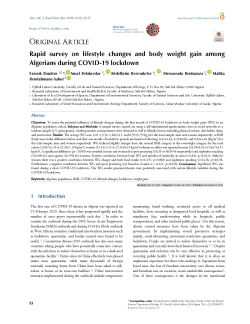Main Article Content
Rapid survey on lifestyle changes and body weight gain among Algerians during COVID-19 lockdown
Abstract
Objectives: To assess the potential influence of lifestyle changes during the first month of COVID-19 lockdown on body weight gains (WG) in an Algerian population cohort. Subjectsand Methods: A sample survey, carried out using a self-administered questionnaire, sent on social networks to a random sample (172 participants). Anthropometric measurements were obtained as well as lifestyle factors including physical activity, diet habits, sleep, and screen time. Results: The average WG was; 1.02 ± 3.36, 1.18±2.15, and 0.95±3.79 (kg) for the total sample, men and women respectively. Δ-BMI (body mass index difference before and after one month of lockdown period) increased as following; 0.42±1.43, 0.39±0.68, and 0.43±1.66 (Kg/m²) for the total sample, men and women respectively. WG induced slightly changes from the normal BMI category to the overweight category for the total cohort (24.87±6.74 vs 25.28±7.19 kg/m²), women (25.13±7.65 vs 25.56±8.19 kg/m²) whereas no effect was reported in men (24.28±4.03 vs 24.67±4.15 kg/m²). A significant difference (p < 0.001) was revealed in men and women for sport practicing (53.33 vs 40.90 % respectively) and nighttime snacking (56.60% for men against 43.55% for women). Positive correlation between body WG and number of meals/day in men (r=0,341, p=0,012), while for women there was a positive correlation between WG change and both food intake (r=0.170, p=0.066) and nighttime snacking (r=0,228, p=0,013). Furthermore, a negative correlation between WG and sport practicing was found in women (r =-0.221, p=0.016). Conclusions: Significant WG was found during a short COVID-19 lockdown. The WG results presented herein were positively associated with certain lifestyle variables during the COVID-19 lockdown.







